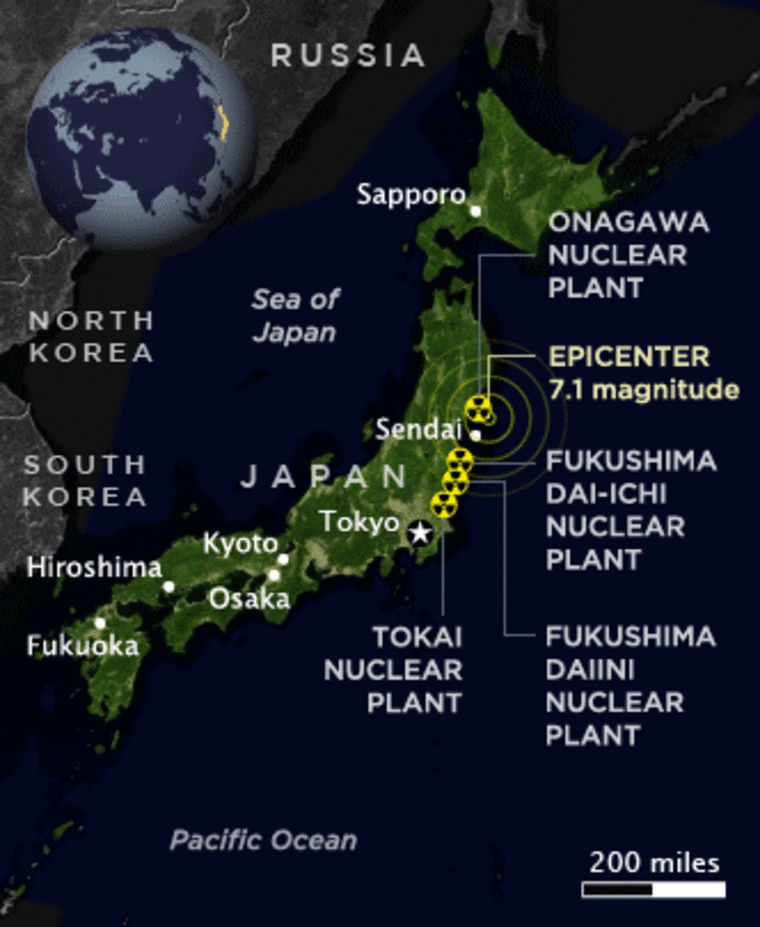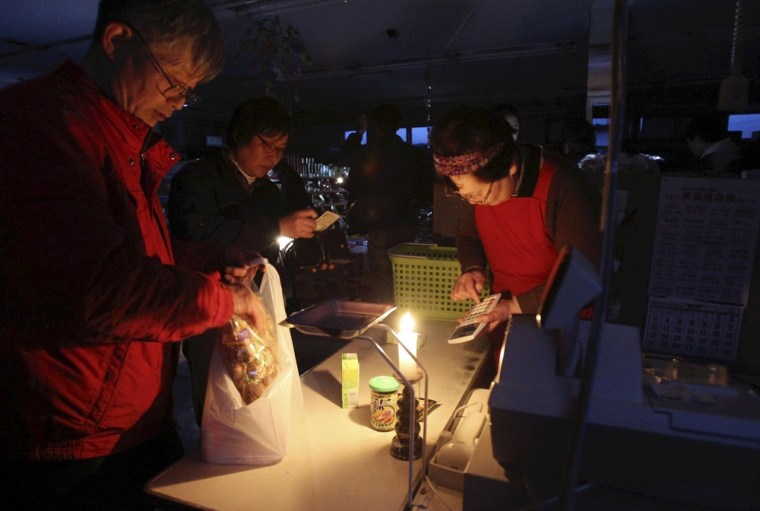Shoppers emptied store shelves, traffic snarled after stoplights lost power and drivers waited in long lines to buy gasoline in a new wave of anxiety Friday after a magnitude-7.1 aftershock struck disaster-weary northeastern Japan.
Nearly a half-million homes were without electricity after the latest tremor, which dealt another setback for those struggling to recover from the earthquake-spawned tsunami that wiped out hundreds of miles of the northeastern coast last month and killed as many as 25,000 people.
"I feel helpless. I am back to square one," said Ryoichi Kubo, 52, who had just finally reopened his gas station in hard-hit Iwate prefecture (state) after the power outage and prolonged fuel shortage that followed the March 11 tsunami. Friday, he was again without electricity, his four gas pumps shut down.
Still, the 7.1-magnitude aftershock on Thursday did far less damage, generated no tsunami and largely spared the region's nuclear plants.
Some slightly radioactive water spilled at one plant, but the tsunami-crippled Fukushima Dai-ichi complex reported no new problems.
"The situation at the Fukushima Dai-ichi nuclear power plant remains very serious ... (but) there are early signs of recovery in some functions such as electrical power and instrumentation," the International Atomic Energy Agency's head of nuclear safety, Denis Flory, said.
China concernedHowever, in China concern was growing about the radioactive water being pumped into the sea from the plant.
China will "closely" monitor Japan's actions to regain control of the plant, the foreign ministry said, demanding that Tokyo provide swift and accurate information on the crisis.
A Chinese watchdog agency also said it had detected 10 cases of ships, aircraft or cargo arriving from Japan with higher than normal levels of radiation since mid-March.

The latest tremor — the strongest since the day of the tsunami — knocked out six conventional power plants in the area, though three have since come back on line and the others should be up again within hours, said Souta Nozu, a spokesman for Tohoku Electric Power Co., which serves much of northern Japan.
But with power lines throughout the area damaged, it was not clear whether normal operations would be restored soon, he said.
About 950,000 households were still without electricity Friday evening local time, Nozu said. That includes homes in prefectures in Japan's northwest that had been spared in the first quake.
Nighttime terrorMatsuko Ito, who has been living in a shelter in the small northeastern city of Natori since the tsunami, said there's no getting used to the terror of being awoken by shaking.
She said she started screaming when the quake struck around 11:30 p.m.
"It's enough," the 64-year-old while smoking a cigarette outside. "Something has changed. The world feels strange now. Even the way the clouds move isn't right."
In Ichinoseki, lines formed outside a supermarket when it opened Friday morning. An employee with a flashlight escorted each customer around the store and jotted the price of each selected item in a pad.
Most businesses were closed in the city, 240 miles northeast of Tokyo.
Free hot potOne restaurant owner, Suzuki Koya, bought a small gas stove and made free meals in big boiling pot.
"I saw the meat at the supermarket and I thought, 'We should do a hot pot,'" the 47-year-old said. "It's good to keep warm in times like these."
Several nuclear power plants briefly switched to diesel generators but were reconnected to the grid by Friday afternoon.
One plant north of Sendai briefly lost the ability to cool its spent fuel pools, but quickly got it back.
At a plant in Onagawa, some radioactive water splashed out of the pools but did not leave a containment building, Tohoku Electric said. Such splash-out is "not unusual, although it is preferable that it doesn't happen," according to Japanese nuclear safety agency official Tomoho Yamada.
'More problems'"Closer inspection could find more problems," said agency spokesman Hidehiko Nishiyama, but no radiation was released into the environment at Onagawa.
Thursday's quake prompted a tsunami warning of its own, but it was later canceled.
Four people were killed, Japanese media said. Broadcaster NHK said on its website that a 74-year-old woman in Matsushima, Miyagi Prefecture, died after falling from the balcony of her third-floor apartment.
NHK said a 79-year-old man and an 85-year-old man died at a hospital in Ishinomaki, possibly of heart attacks. A woman in her 60s was killed when power was cut to her oxygen tank, national fire and disaster agency spokesman Junichi Sawada said.
That pales in comparison to the original quake and tsunami, in which more than 25,000 people are believed to have died.
Many of those bodies have still not been found: A significant portion were likely washed out to sea and never will be, but some are buried in areas that have been largely off-limits to search teams.
As radiation spilling from the troubled Fukushima Dai-ichi plant has fallen in recent days, however, police have fanned out inside a no-go zone near the complex to dig for the dead.
On Friday, hundreds of police, many mobilized from Tokyo, used their hands or small shovels, pulling four bodies in an hour from one small area in the city of Minami Soma. The had found only five bodies the previous day.
Mountain of debrisThe searchers, wearing white radiation gear and blue gloves, struggled to bring the remains across the rubble to vans and minibuses that would take them to the nearest morgue. Each body was carefully hosed off to rid it of radiation before being placed in the vehicles.
"The area is literally a mountain of debris. It is an extremely difficult task," said an official with police in Fukushima prefecture who declined to be named because he was not authorized to talk to the media.
Compounding Tokyo's problems, Japan's economy is reeling from the worst disaster since World War Two and the disruption to Japanese supply chains is reverberating around the world,
Power blackouts and restrictions, factory shutdowns, and a sharp drop in tourists have hit the world's most indebted nation, which is facing a damages bill as high as $300 billion, making it by far the world's costliest natural disaster.
Recession expectedMany economists expect Japan to slip into recession this year, and the central bank warned on Friday power shortages and supply disruptions will leave the economy weak for some time.
The Cabinet Office's assessment was equally bleak after releasing a survey reflecting the first glimpse of damage to business and consumer sentiment.
"Japan's economy is suddenly in a severe condition due to the effects of the earthquake," it said after releasing a monthly survey of hotel workers, restaurant staff and taxi drivers that showed a record fall in confidence to levels last seen during the depths of the global financial crisis.
Some ministers at Friday's cabinet meeting called for an end to a campaign of "jishuku" (self restraint) by ordinary people that was adopted immediately after March 11 to cut fuel or electricity use and discourage stockpiling of necessities.
Msnbc.com staff contributed to this report from The Associated Press and Reuters.
